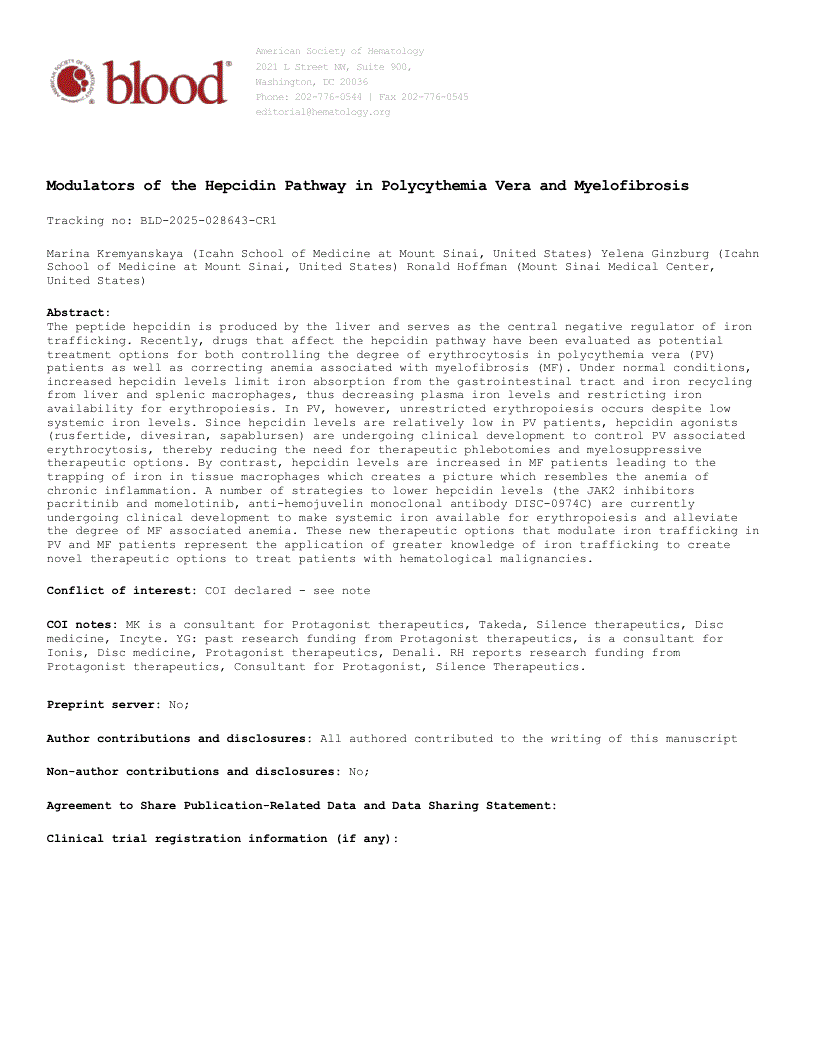The peptide hepcidin is produced by the liver and serves as the central negative regulator of iron trafficking. Recently, drugs that affect the hepcidin pathway have been evaluated as potential treatment options for both controlling the degree of erythrocytosis in polycythemia vera (PV) patients as well as correcting anemia associated with myelofibrosis (MF). Under normal conditions, increased hepcidin levels limit iron absorption from the gastrointestinal tract and iron recycling from liver and splenic macrophages, thus decreasing plasma iron levels and restricting iron availability for erythropoiesis. In PV, however, unrestricted erythropoiesis occurs despite low systemic iron levels. Since hepcidin levels are relatively low in PV patients, hepcidin agonists (rusfertide, divesiran, sapablursen) are undergoing clinical development to control PV associated erythrocytosis, thereby reducing the need for therapeutic phlebotomies and myelosuppressive therapeutic options. By contrast, hepcidin levels are increased in MF patients leading to the trapping of iron in tissue macrophages which creates a picture which resembles the anemia of chronic inflammation. A number of strategies to lower hepcidin levels (the JAK2 inhibitors pacritinib and momelotinib, anti-hemojuvelin monoclonal antibody DISC-0974C) are currently undergoing clinical development to make systemic iron available for erythropoiesis and alleviate the degree of MF associated anemia. These new therapeutic options that modulate iron trafficking in PV and MF patients represent the application of greater knowledge of iron trafficking to create novel therapeutic options to treat patients with hematological malignancies.
Skip Nav Destination
Review Article|
October 16, 2025
Modulators of the Hepcidin Pathway in Polycythemia Vera and Myelofibrosis Available to Purchase
Marina Kremyanskaya,
Icahn School of Medicine at Mount Sinai, New York, New York, United States
* Corresponding Author; email: marina.kremyanskaya@mssm.edu
Search for other works by this author on:
Yelena Z Ginzburg,
Yelena Z Ginzburg
Icahn School of Medicine at Mount Sinai, New York, New York, United States
Search for other works by this author on:
Ronald Hoffman
Ronald Hoffman
Mount Sinai Medical Center, New York, New York, United States
Search for other works by this author on:
Blood blood.2025028643.
Article history
Submitted:
July 13, 2025
Revision Received:
August 25, 2025
Accepted:
September 5, 2025
Citation
Marina Kremyanskaya, Yelena Z Ginzburg, Ronald Hoffman; Modulators of the Hepcidin Pathway in Polycythemia Vera and Myelofibrosis. Blood 2025; blood.2025028643. doi: https://doi.org/10.1182/blood.2025028643
Download citation file:
My Account
Sign InAdvertisement intended for health care professionals
Cited By
Advertisement intended for health care professionals


This feature is available to Subscribers Only
Sign In or Create an Account Close Modal